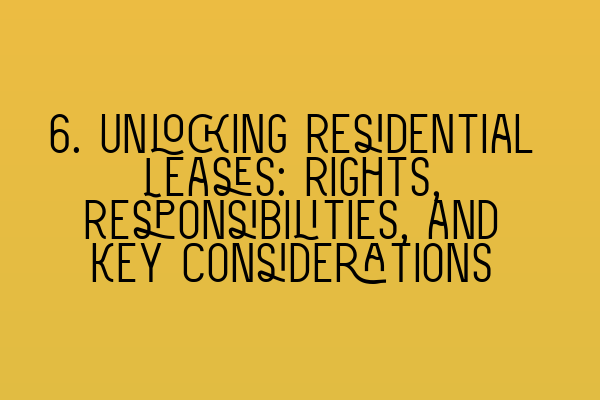Unlocking Residential Leases: Rights, Responsibilities, and Key Considerations
As a homeowner or property investor, understanding the intricacies of residential leases is crucial to making informed decisions about your property. Unlocking the true potential of residential leases requires a deep understanding of the rights and responsibilities involved, as well as key considerations that can impact your investment. In this blog post, we will explore six important aspects of residential leases that every property owner or investor should know.
1. Leasehold vs. Freehold: Understanding the Basics
Before delving into the specifics of residential leases, it is important to grasp the fundamental concept of leasehold vs. freehold ownership. Leasehold ownership entails owning the right to occupy a property for a set number of years, while freehold ownership grants outright ownership of the property and the land it stands on. Leasehold properties are typically subject to certain restrictions and obligations, making them a key focus of this discussion.
For more information on the basics of property ownership, take a look at our article on SQE 1 Practice Exam Questions.
2. Lease Terms: Length, Renewal, and Termination
Understanding the terms of a residential lease is vital to fully utilize its potential. Lease terms can vary widely, ranging from short-term leases of a few years to long-term leases spanning several decades. It is crucial to be aware of the renewal and termination provisions in a lease, as these can significantly impact your investment strategy and financial planning.
To further explore this topic, we recommend reading our comprehensive guide on SQE 1 Practice Mocks FLK1 FLK2.
3. Ground Rent and Service Charges: Financial Considerations
Residential leases often require leaseholders to pay ground rent and service charges to the landlord or management company. Ground rent is a regular payment made by the leaseholder to the landlord as a form of rent for the land on which the property is built. Service charges, on the other hand, cover the cost of maintaining and managing the communal areas and facilities.
To gain a deeper understanding of the financial aspects of residential leases, it is advisable to explore our range of SQE 2 Preparation Courses.
4. Repairs and Maintenance: Responsibilities of Leaseholders and Landlords
Determining who is responsible for repairs and maintenance is a critical consideration for leaseholders and landlords alike. While leaseholders are generally responsible for minor repairs and maintenance within their individual properties, the landlord or management company typically has an obligation to maintain the structure and communal areas of the building. It is essential to thoroughly review the terms of the lease to understand these responsibilities.
For comprehensive guidance on responsibilities related to repairs and maintenance, check out our informative article on SQE 1 Preparation Courses.
5. Alterations and Improvements: Seek Permission
Leaseholders often desire to make alterations or improvements to their properties to suit their personal preferences or enhance their value. However, it is important to note that significant alterations or improvements generally require the permission of the landlord or management company. Failure to seek permission where required can lead to disputes and potential legal consequences.
To find out more about seeking permission for alterations and improvements, you may be interested in our article on SRA SQE Exam Dates.
6. Lease Extensions and Enfranchisement: Maximizing Your Investment
Leaseholders seeking to extend their lease or gain ownership of the freehold can unlock substantial value and security in their investment. Lease extensions allow leaseholders to extend the length of their lease, while enfranchisement provides an opportunity for leaseholders to collectively purchase the freehold of their building. These options can be complex legal processes, and it is advisable to seek professional advice to navigate them successfully.
To explore the potential of lease extensions and enfranchisement, we recommend consulting our expert team at SQE Property Law & Land Law.
In conclusion, unlocking the full benefits of residential leases requires a thorough understanding of rights, responsibilities, and key considerations. By familiarizing yourself with lease terms, financial obligations, repair responsibilities, permissions for alterations, and the options for lease extensions and enfranchisement, you can make informed decisions and maximize the value of your property investment.
To learn more about residential leases and property law, browse our website and get in touch with our team of experienced solicitors at SQE Property Law & Land Law.
